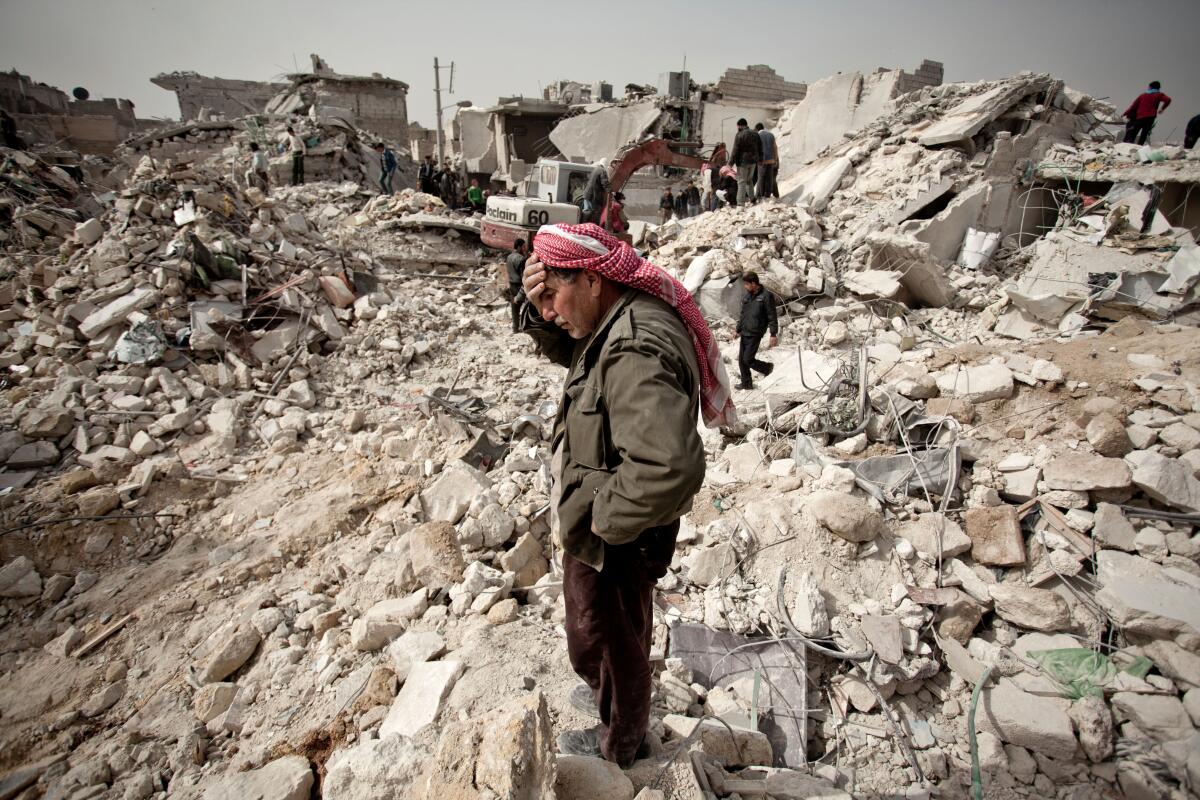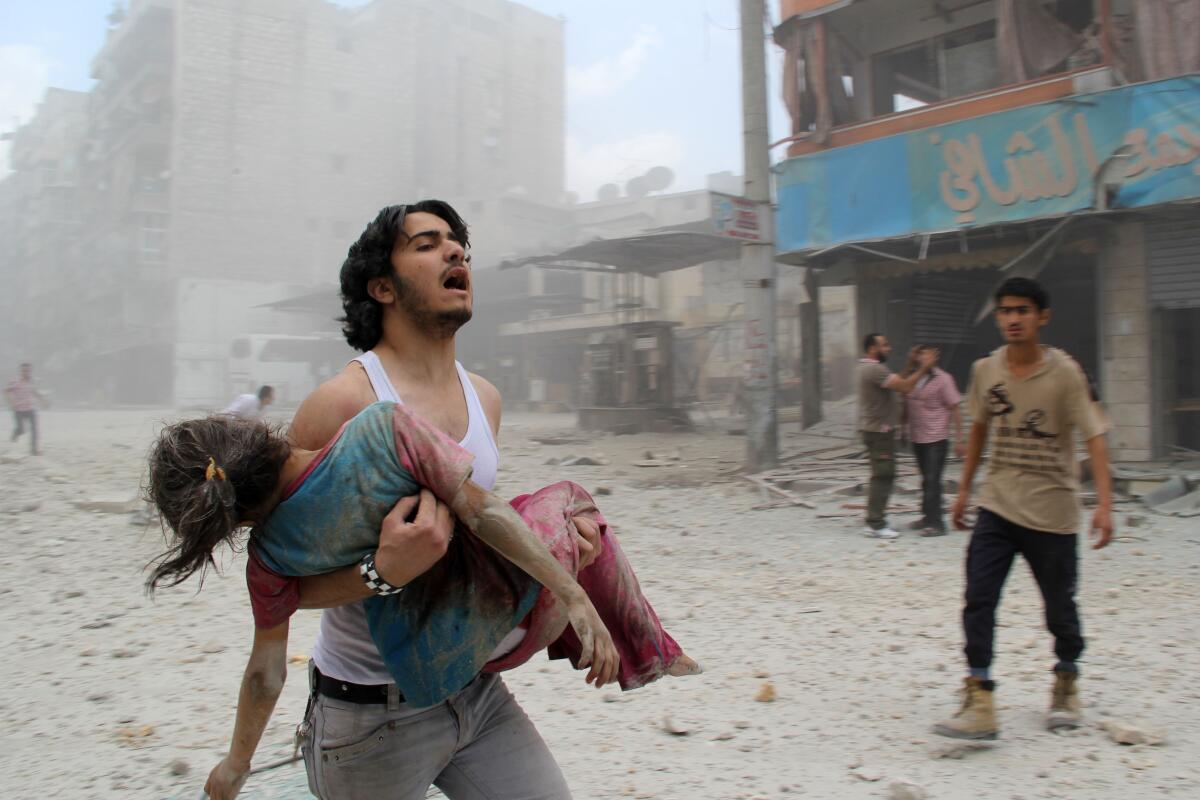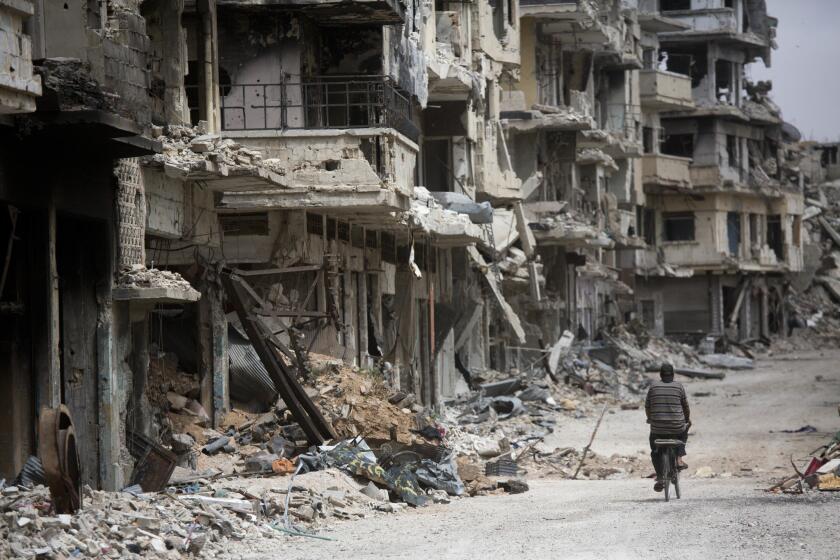Review: How does it feel to see your city destroyed? A new Syrian novel on Aleppo

On the Shelf
Roundabout of Death
By Faysal Khartash
Translated from the Arabic by Max Weiss
New Vessel: 176 pages, $17
If you buy books linked on our site, The Times may earn a commission from Bookshop.org, whose fees support independent bookstores.
Not much happens in Faysal Khartash’s “Roundabout of Death” — although in another sense, everything does. First published in Arabic in 2017, it is a novel about the destruction of the ancient city of Aleppo refracted through the filter of those left behind. The central character is an out-of-work teacher named Jumaa, but more accurately he is a cipher, since the real protagonist is the Syrian city itself.
Even the title refers to a geographic borderline: “most likely a reference,” translator Max Weiss notes in his introduction, “to the fearsome Karaj al-Hajez crossing point between the eastern and western sides of the city.” Khartash is more pointed about the demarcation separating regions controlled by the government from those in rebel hands. “The city was divided in half, and those two halves never intersected,” he writes. “... All forms of communication had been severed between east and west. Aleppo was besieged.”
Khartash was born and raised in Aleppo, and much of his fiction — he is the author of several novels — takes place there. “Roundabout of Death” is the first to be translated into English, and it opens early on a morning in August 2012 as the electricity is going out. It’s a masterful way to get things started, a small disruption that keeps growing until it becomes all-encompassing.
That loss of power is both a metaphor and the harshest reality, as it is followed immediately by a fighter jet attack. “The pilot,” Khartash tells us, “might … decide to jettison something off to the side that razes houses or shops or mosques, and whoever is left alive will simply have to wait for the next round of shelling, a role created for them … until the pilot completes his mission and returns safely to base, washed his hands, runs off to scarf down his meal and head to sleep because it’s well past his bedtime.”
Here we see the pattern of the novel, which is kaleidoscopic: personal and collective, serendipitous and fatalistic, marked by a bitter irony that can’t help flirting with despair. In that, it’s reminiscent of the work of Khaled Khalifa, whose “No Knives in the Kitchens of This City” (2013) offers another elliptical portrait of Aleppo under siege.
“If you really want to erase or distort a story,” Khaled Khalifa declares in his astonishing new novel “Death Is Hard Work,” “you should turn it into several different stories with different endings and plenty of incidental details.”
But unlike Khalifa’s novel, which is swathed in history, “Roundabout of Death” unfolds in the moment. Among its prime conceits is that, in a city ravaged by war, there is no past or future, just an endless and ongoing present. Narrative has been lost, leaving us with only isolated fragments of experience that refuse to coalesce. “It was a calm morning,” Khartash observes, “everything on our west side of the city was chaotic, cars were driving the wrong way on the roads. If people were driving the wrong way, though, that was only because everything had been turned upside down.”
That upside down quality asserts itself continuously, as Jumaa and his fellow residents traverse the broken, partitioned city. There are checkpoints and sniper fire and random arrests, fear and inconvenience and monotony.

“The trip took nearly three hours and fifteen minutes,” Jumaa reports of a shuttle van ride; “one that used to take me fifteen minutes now required three more hours of our time.” The sentence is instructive not only for what it says but also for how it moves. It’s the subtle switch from singular to plural, from that “me” to “our.”
Khartash employs this sort of device throughout “Roundabout of Death,” a strategy that allows him to open the narrative, and the desolation, beyond Jumaa alone. Again and again — often within the span of a paragraph — he shifts the focus from first to third person, present tense to past. The effect is of a floating point of view that narrows and widens, both deeply rendered and impossible to pin down.
What Khartash is tracking is the precariousness of memory — and identity. For Jumaa, who spends much of his time wandering Aleppo to check on his aging mother or gather food for his family, it’s a matter of obsessively recalling what is missing, the fiber of the city that has been destroyed. For others, the reckoning is more desperate.
The interior is at stake as Paul Yoon explores the experiences of a North Korean defector who ends up in Brazil. It’s a lovely novel, subtly rendered.
That’s the case with Miss Beauties, a prostitute who has been brutalized. Khartash begins her backstory glancingly, almost as an aside. “[A] woman whose name I forget came into the city,” he recollects. “She didn’t know the first thing about what was going on.”
The narrator’s failure to remember initiates, or predicts, the amnesia of the character. From one angle it’s erasure, from another empathy.
“[T]hen she forgot about everything,” Khartash continues, “forgot her husband and her children and her village, and the women who used to sit with her every night, forgot her own memory even, now could no longer remember what had happened to her or who had done what with her, until finally she fell asleep.” With that, Miss Beauties disappears. She is forgotten not only by herself and by the narrator but by the readers of “Roundabout of Death” as well.
In such an environment, survival becomes an act of complicity. Remembering is dangerous when attachments are so tenuous; better to isolate, to distance or to euphemize. For Jumaa, this can sometimes mean abstracting himself, as when the narration shifts from first person to third. And yet, these defensive postures go only so far.
As the novel progresses, we meet Jumaa’s wife, who is unhappy; we share their grief after their son is detained. Even this bit of movement, however, can’t alter the static reality that marks much of life during wartime. “Now here I sit in the cafe all alone,” Jumaa reflects. “As I think about everything that has happened, I muse to myself: Tomorrow’s only a day away.”
Were his situation different, we might read those words as hopeful. But as it is, they are resigned and watchful, written by “someone dangling at the edge of an abyss.”
As Syrians mark the fifth anniversary of the uprising against President Bashar Assad, here are some of the key events in the conflict: — March 2011: Protests erupt in the city of Dara over security forces’ detention of a group of boys accused of painting antigovernment graffiti on the walls of their school.
Ulin is a former books editor and critic of The Times.
More to Read
Sign up for our Book Club newsletter
Get the latest news, events and more from the Los Angeles Times Book Club, and help us get L.A. reading and talking.
You may occasionally receive promotional content from the Los Angeles Times.








